It is autumn in Belgium and amongst other things the weather keeps me inside thus I thought I write another Soldbuch thread on this forum.
Wilhelm Feith (°1917) a former warehouse manager from Hamburg was in 1939 a sergeant and telex specialist.
At the out break of the war he served in a Luftwaffe telex station in Bremen, after the capitulation of Dunkirk he is sent to operate telex communication from Brias airfield (Pas de Calais) in Northern France from which LW fighters operate in the battle of Britain.
In 1944 his unit is transferred to the airfield in Montdidier.
Until August 1944 Oberfeldwebel Wilhelm Feith is enjoying the easy life of a German soldier in occupied France but when the allies break out of Normandy this easy life comes to an end, his unit packs up and leaves for Germany, they take the northern retreat route through Belgium and on September 3 1944 they want to cross the Albert canal somewhere east of Antwerp and this is where it gets interesting.
His unit crosses the canal in a sector that is held by the remnants of the 85ID commanded by general Chill, he has given the order to halt all retreating troops, doesn't matter to which service branch or units they belong and to reorganize them in combat formation that will defend the Albert canal against the allies that are in full pursuit.
The plan works, officers of the 85ID man the bridges and sent all the soldiers that cross the bridges under armed escort to the barrack camp in Turnhout, here they are basically detained until they are assigned to a newly created combat formation.
(About 900 men of former airfield operation units end up in KG Chill)
In the case of Wilhelm Feith and his unit they are assigned to Kampfgruppe Dreyer and sent to the sector in Gheel.
After two days of the rest, the allies assume their advance and in an attempt to move to their jump off positions for operation Market, the ground offensive of operation Market-Garden, the 50th Northumbrian Division tries to cross the Albert canal in the sector Gheel.
The fighting is fierce and Wilhelm Feith gets two combat days in this battle, one on September 8 on the canal itself near Meulenberg and another on September 12 near Pojel a few miles north of the canal.
On September 15 1944 he is awarded the EKII.
And after a third officially recognized combat day, on September 26 near Heihof, he is awarded the LW ground combat badge.
The next entries in his Soldbuch, March 1945, we find him back with telex unit on an airbase in Germany, what he does in the periode October '44-March 1945 I don't know, but he sure saw combat in September 1944.
In my collection I have a Soldbuch of an officer of the 85ID/KG Chill.
Perhaps he was the officer in charge on the bridge they tried to cross in early September 1944.
http://www.k98kforum.com/showthread.php?15429-Soldbuch-set-El-Alamein-Stalingrad
Wilhelm Feith (°1917) a former warehouse manager from Hamburg was in 1939 a sergeant and telex specialist.
At the out break of the war he served in a Luftwaffe telex station in Bremen, after the capitulation of Dunkirk he is sent to operate telex communication from Brias airfield (Pas de Calais) in Northern France from which LW fighters operate in the battle of Britain.
In 1944 his unit is transferred to the airfield in Montdidier.
Until August 1944 Oberfeldwebel Wilhelm Feith is enjoying the easy life of a German soldier in occupied France but when the allies break out of Normandy this easy life comes to an end, his unit packs up and leaves for Germany, they take the northern retreat route through Belgium and on September 3 1944 they want to cross the Albert canal somewhere east of Antwerp and this is where it gets interesting.
His unit crosses the canal in a sector that is held by the remnants of the 85ID commanded by general Chill, he has given the order to halt all retreating troops, doesn't matter to which service branch or units they belong and to reorganize them in combat formation that will defend the Albert canal against the allies that are in full pursuit.
The plan works, officers of the 85ID man the bridges and sent all the soldiers that cross the bridges under armed escort to the barrack camp in Turnhout, here they are basically detained until they are assigned to a newly created combat formation.
(About 900 men of former airfield operation units end up in KG Chill)
In the case of Wilhelm Feith and his unit they are assigned to Kampfgruppe Dreyer and sent to the sector in Gheel.
After two days of the rest, the allies assume their advance and in an attempt to move to their jump off positions for operation Market, the ground offensive of operation Market-Garden, the 50th Northumbrian Division tries to cross the Albert canal in the sector Gheel.
The fighting is fierce and Wilhelm Feith gets two combat days in this battle, one on September 8 on the canal itself near Meulenberg and another on September 12 near Pojel a few miles north of the canal.
On September 15 1944 he is awarded the EKII.
And after a third officially recognized combat day, on September 26 near Heihof, he is awarded the LW ground combat badge.
The next entries in his Soldbuch, March 1945, we find him back with telex unit on an airbase in Germany, what he does in the periode October '44-March 1945 I don't know, but he sure saw combat in September 1944.
In my collection I have a Soldbuch of an officer of the 85ID/KG Chill.
Perhaps he was the officer in charge on the bridge they tried to cross in early September 1944.
http://www.k98kforum.com/showthread.php?15429-Soldbuch-set-El-Alamein-Stalingrad
Attachments
-
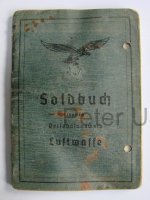 DSC09602.jpg78.8 KB · Views: 20
DSC09602.jpg78.8 KB · Views: 20 -
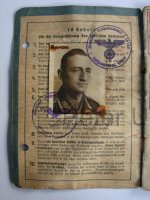 DSC09603.jpg88 KB · Views: 37
DSC09603.jpg88 KB · Views: 37 -
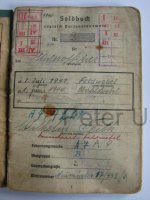 DSC09604.jpg76.3 KB · Views: 22
DSC09604.jpg76.3 KB · Views: 22 -
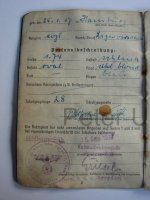 DSC09605.jpg69 KB · Views: 22
DSC09605.jpg69 KB · Views: 22 -
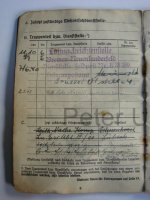 DSC09607.jpg82.9 KB · Views: 24
DSC09607.jpg82.9 KB · Views: 24 -
 DSC09608.jpg135.9 KB · Views: 22
DSC09608.jpg135.9 KB · Views: 22 -
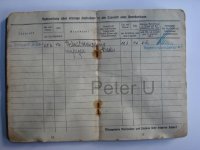 DSC09609.jpg104.1 KB · Views: 20
DSC09609.jpg104.1 KB · Views: 20 -
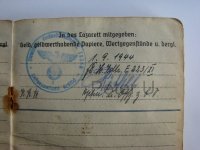 DSC09610.jpg109.2 KB · Views: 20
DSC09610.jpg109.2 KB · Views: 20 -
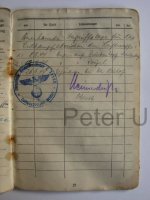 DSC09612.jpg70.4 KB · Views: 22
DSC09612.jpg70.4 KB · Views: 22 -
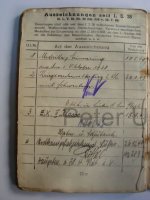 DSC09613.jpg68 KB · Views: 20
DSC09613.jpg68 KB · Views: 20



